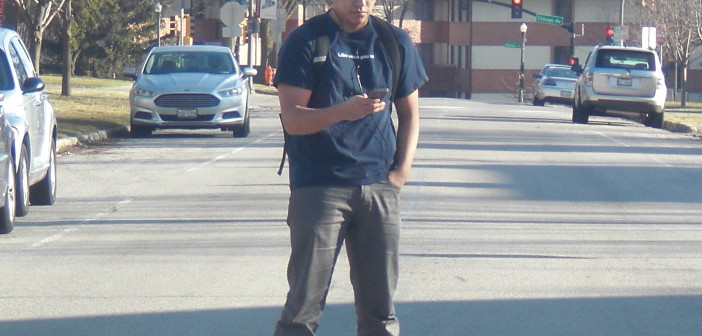In exploring how young men sometimes form their identity through their music, it’s inexcusable to forget the parallel effect that it [music]has on male sexuality.
Just as any other message conveyed to the youth through song, sexuality has the power to reinforce, to fill in blanks, to set off opinions or to create curvature in respect to the attitudes assumed by listeners.
Much of the time, the idea of heterosexuality is projected across the music scene and reinforces what is commonly accepted.
When heterosexuality is brought forth in discussion, homosexuality may also come into play. Homosexuality, itself, is under fire between listeners and viewers, and the issue has yet to be fully mulled over.
With a growing base of support, homosexuality has reached a point where it can be displayed in music. Though minimally and often times separate of outlets featuring heterosexuality, progress is being made.
LOGO TV and Pride Nation offer LGBTQ-oriented cable programming. At the network TV level, NBC’s Ellen, DeGeneres is an openly gay syndicated talk show host that homosexuals have identified with since coming out as a lesbian in 1997, according to wmagazine.com.
Media exposure to homosexuality helped to charge some states to legalize gay rights to marriage. As of December 2013, the same-sex marriage law was officially signed by 17 states and Washington D.C., according to freedomtomarry.org.
In exploring songs from artists spanning multiple genres that have shook the media, take a look at how music and sexuality have intersected.
As a heterosexual hip-hop artist, Macklemore tackled the issue of homosexuality through the song “Same Love” with Ryan Lewis and Miranda Lambert. His support is one of significance because hip-hop often does not address the issue. In “Same Love,” Macklemore recites,
“Gay” is synonymous with the lesser
It’s the same hate that’s caused wars from religion
Gender to skin color, the complexion of your pigment
The same fight that led people to walk outs and sit ins
It’s human rights for everybody, there is no difference
Live on! And be yourself!
He pinpoints how hate is still so prevalent in our communities. Though it may not be outright violence, verbal expression of hate toward homosexuals can hurt on a large level too. He mandates that his listeners answer the call of duty by saying, look at what’s wrong here. Let people be themselves.
In R&B, Frank Ocean croons about losing and remembering his first love in “Forrest Gump.” Ocean assumes the role of Jenny Curran, who was on the losing end of love, in the 1994 film “Forrest Gump.” Interestingly enough, Ocean is bisexual and this adds a layer of nuance to the song. He sings,
My Fingertips and my lips
They burn from the cigarettes
Forrest Gump you run my mind, boy
Running on my mind boy
Forrest Gump
When he sang about this, he illustrated the importance of loving with all that you have. When true love gets away, whether it’s homosexual or heterosexual, it can come back to haunt the person at fault more times than not.
The former “American Idol” contestant and pop star Adam Lambert belts out in “If I Had You” about his desire to find unrequited love. He sings,
There’s a thin line tween a wild time and a flat
line baby tonight
It’s a struggle, gotta rumble tryin’ to find it
But if I had you, that would be the only thing I’d
ever need
Now openly identifying himself as homosexual, Lambert declares his readiness to do without things—fame, money and beauty—that people tend to fawn over. Lambert’s “If I Had You” is a song that anyone can relate to regardless if gay or straight. It is this showing of rawness that makes for a strong pop song for Lambert.
While artists have had success with inserting their sexualities or ideologies regarding love into their music, homosexuality bares more of a clash than anything to hip-hop. The genre is defined by the masculinity of its male artists. This is as an interesting complex for music industry professionals and creators.
More specifically, gangsta rap can be considered one of the most difficult forms of music for homosexuals to pass off as convincing material that can generate success. If we examine how homosexuality was spotlighted in 2007 when the now defunct Baby Phat Records label signed Caushun, who was supposed to be the first openly gay, gangsta rap artist. The push to bring mainstream attention to Caushun was featured in Robin R. Means Coleman and Jasmine Cobb’s “No Way of Seeing: Mainstreaming and Selling the Gaze of Homo-Thug Hip-Hop.”
As it came to be known later, the “hip-hop persona” Caushun was not real but actually a joke gone too far, said ghostwriter Ivan Mattias in a confession to allhiphop.com. Jokes like that make it difficult for homosexuals to create space for themselves in mainstream music. To this day, a clashing of values and a mark of radicalness cloud over the music business fails in helping to make matters less difficult for homosexuals.
While issues with homosexuality may continue to be debated for some time, it is my hope that the LGBTQ community remains hopeful for added success in its venture to brighten the media’s spotlight on men.

